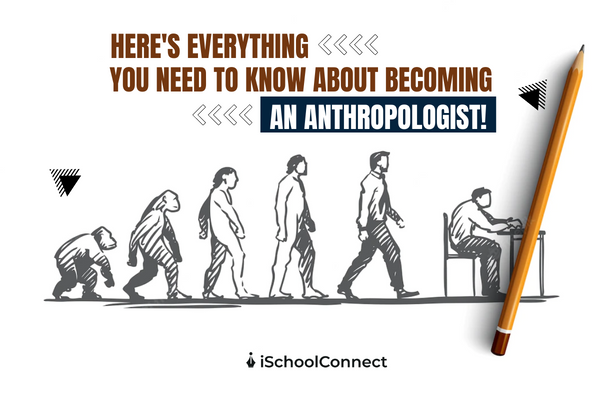Table of Contents
Anthropology- The study of humans
The study of anthropology focuses on what makes humans human. Holism is the approach that anthropologists use to explore all the varied facets of the human experience. They look to the past through archaeology to understand how and what mattered to human groups hundreds or thousands of years ago. They take into account our bones, diet, and health, as well as the biological components of our bodies and DNA. To determine what we have in common with other creatures and what sets us apart, anthropologists often compares humans with other species, most frequently with other primates like monkeys and chimpanzees. Although almost all people require the same things to thrive, such as food, water, and company, the ways in which these needs are met might vary greatly.
Why study anthropology?
Anthropologists research the idea of culture and how it relates to human life in various eras and locations. They research different societies in order to get a better understanding of our own. To better understand the present, they research the history. Students who major in anthropology have an interest in different cultures and historical periods. Anthropologists also research our distant history and our beginnings, particularly through the branch of archaeology that recovers and examines physical and material remains. They are puzzle enthusiasts and have a curious nature. Students who major in anthropology develop their observation, analysis, research, critical thinking, writing, and intercultural communication abilities, as well as a broad knowledge of different cultures.
Anthropologists also attempt to comprehend how individuals interact in social settings (for example, with families and friends). They study how individuals interact and dress differently in various societies. These parallels are occasionally used by anthropologists to better understand their own society. Many anthropologists examine the economy, health, education, law, and policy (to name just a few topics).in their own communities. They keep in mind what they know about biology, culture, different forms of communication, and how humans once lived when attempting to comprehend these difficult challenges.
There are four subfields of anthropology:
- Archaeology
- Bioanthropology
- Linguistic anthropology
- Social-cultural anthropology.
Archaeology

The study of people, both current and past, using physical remains—what people “leave behind”—as proof, is called archaeology. Archaeologists put together minor clues to construct interpretive arguments, much like detectives or crime scene investigators.
Bio-anthropology
A biosocial science called bio-anthropology examines the sociology and biology of human groups. From our historical origins and diversity to our likely future as planet residents, biological anthropologists are interested in the development of humans. Research in subfields such as paleoanthropology, human biology, primatology, and evolutionary psychology examines how human culture and behavior relate to other areas of the subject, including evolutionary psychology.

Linguistic anthropology
In the context of the societies that gave rise to them, linguistic anthropology investigates the nature of human languages. In addition to examining how linguistic activities are rooted in social and cultural formations, researchers in the field, work to understand the social and cultural roots of language itself.
Language is used by individuals to negotiate, compete, and reproduce social structures and cultural forms, according to linguistic anthropologists. They look at how language can shed light on the origins and development of culture and human society.
Social-cultural anthropology

Social-cultural anthropology explores the variety of human societies throughout time and place while seeking out their shared characteristics. It employs a comprehensive approach that connects the local and the global, the historical and the contemporary, to provide a variety of perspectives on today’s concerns.
All anthropologists employ distinctive views when doing their research. These viewpoints set anthropology apart from allied fields that explore the past, society, and human nature, such as history, sociology, and psychology. The major anthropological viewpoints include fieldwork, relativism, holism, and comparison. The discipline has both scientific and humanistic impulses that can clash with one another.
Key takeaways
- Anthropology is the systematic study of human specialty concerned with the study of human behavior and its characteristics
- There are 4 subfields of anthropology
- The major anthropological viewpoints include fieldwork, relativism, holism, and comparison.
Did you find this blog informative? If so, please share your thoughts in the comments below Click here to contact us for more information on anthropology. We would be happy to assist you with your queries.
Liked this blog? Read next: Archaeology | Everything you must know about this course
FAQs
Q1. What problems can anthropologists solve?
Answer- Applied anthropologists work to solve real-world problems by using anthropological methods and ideas. For example, they may work in local communities, helping to solve problems related to health, education or the environment. They might also work for museums or national or state parks, helping to interpret history.
Q2. How do anthropologists solve social issues?
Answer- Anthropology can help solve social problems by studying societies in which certain social relationships have fewer conflicts than in one’s own society. Understanding what makes a culture or a unit of individuals tick, hence, it will shed light on how these relationships function within one’s own society.
Q3. How do anthropologists study modern media?
Answer- Media anthropologists study mass communication (broadcast radio and television) and digital media (internet, streaming, and mobile telephony) with a particular interest in the ways in which media are designed or adapted for use by specific communities or cultural groups.






